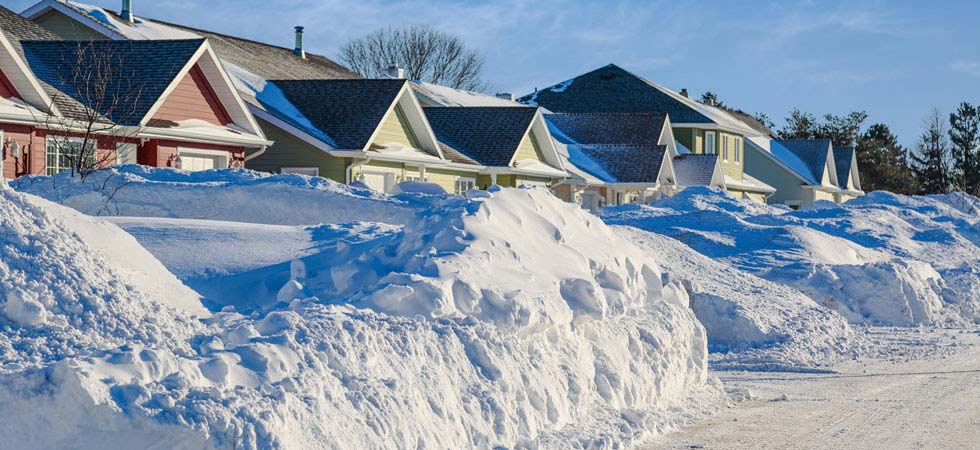
In September 2021, a confidential settlement was reached in a personal injury and wrongful death lawsuit that arose from a propane explosion near Mandan, North Dakota. The case was settled on the sixth day of a jury trial before the jury reached a verdict. Leaking gas had been ignited after accumulated snow broke exterior gas piping at the second stage regulator. The case is Howe v. Tri-Energy Cooperative.
Fractured Pipe
Shortly after midnight on Dec. 14, 2016, an explosion destroyed the home of Clyde and Elizabeth Howe in Mandan, North Dakota. They were killed in the explosion, and Elizabeth’s teenage daughter, Elianna Vasquez, was severely injured.
Investigators later determined that the explosion resulted from a propane leak caused when an accumulation of snow and ice fractured a gas pipe on the downstream side of the second stage regulator.
Propane was supplied to the Howe residence by Tri-Energy Cooperative. In July 2012, Tri-Energy had leased a propane tank to the Howes and installed an underground pipe to connect it to an existing stub-out pipe at an exterior wall of the residence. Tri-Energy installed a first-stage pressure regulator at the tank and a second-stage regulator at the wall of the residence where the existing stub-out was located.
Under the Eave
The stub-out pipe was located under an eave, and that is where the Tri-Energy technician installed the gas riser and second stage regulator. This was clearly the most convenient location for the riser and regulator. Installation of these items on the gable end of the house would have required additional piping to connect to the existing stub-out, or it would have required new piping installation inside the house to create a new stub-out on the gable end.
When Clyde Howe signed the lease for the propane tank, he signed an acknowledgment that he had received propane safety pamphlets from Tri-Energy. In July 2012, Tri-Energy provided two publications to the Howes — a 32-page booklet entitled “Propane Safety” and a brochure entitled “Important Propane Safety Information.”
These publications are published by the Propane Education & Research Council (PERC) and have been widely distributed to propane customers throughout the United States since 2005.
Safety Literature
The booklet discusses the limitations of odorant as a warning for leaking propane and provides information on electronic gas detectors as a backup for the odorant warning.
It also warns customers to regularly clear snow and ice from external piping and regulators, since failure to do so could cause damage and a gas leak.
The brochure addresses the odorant and gas detector issues but not the risk of damage from snow and ice. In addition to providing these safety materials to the Howes when service was initiated, Tri-Energy periodically mailed the brochure to them, and it also included safety warnings on the back of each delivery ticket.
Despite these multiple warnings, the Howes did not install any electronic gas detectors in their home, and they apparently failed to clear snow from the area of the second stage regulator.
Sewer Odor
On the day before the explosion, Charlie Vasquez (Elizabeth’s son) smelled a strong sulfur odor in the house. He asked his mother about the odor, and she thought it was from a frozen sewer line.
That evening, Elianna returned to the house and smelled the same strong odor, both in the garage and inside the house. She also attributed it to a sewer problem, and she went to bed. Clyde and Elizabeth also went to bed. Charlie was not at the residence that night.
After the explosion, a lawsuit was filed on behalf of the estates of Clyde and Elizabeth, and on behalf of Elianna (who was a minor). The plaintiffs sued Tri-Energy, as well as CHS Inc. CHS was the wholesale supplier of propane to Tri-Energy. Represented by my former colleague, John Hansen, CHS was dismissed from the case prior to trial.
Heavy Snow
The plaintiffs argued that “the source of the leaking propane was a fractured 1-inch steel pipe just inside the home, across the threads at an elbow fitting, between the horizontal pipe section that penetrated the wall and vertical leg that dropped into the crawl space.” They added that “the likely cause of the piping fracture was an excessive load placed upon the regulator and its connected piping outside by the heavy snow/ice conditions.”
The plaintiffs contended that the regulator and associated piping were not properly protected from the forces of accumulated snow. They said that, given that North Dakota is subject to heavy snowfall from time to time, Tri-Energy should have employed special measures (such as a hood over the regulator, placement of the regulator inside the structure, use of an integral two-stage regulator at the tank, or placement of the regulator on the gable end of the house) to protect the regulator from heavy snow.
Code Requirements
NFPA 58, which was adopted in North Dakota, includes a special provision calling for the protection of regulators and related equipment from the forces of accumulated snow. However, such measures are required only in “areas of heavy snowfall” as defined in the code.
Both sides agreed that North Dakota is not an “area of heavy snowfall” under the code. However, the plaintiff argued that Tri-Energy had a duty to employ special protection measures even though NFPA 58 did not require them at the Howe residence. Tri-Energy moved for summary judgment based on its compliance with the code.
However, the court denied the motion, holding that it was for the jury to decide whether Tri-Energy was negligent in not providing special protection for the Howe regulator beyond the requirements of NFPA 58:
“The Court concludes that the jury must find as a matter of fact, not the Court as a matter of law, whether Tri-Energy should have reasonably taken additional precautions or actions beyond those required by NFPA 58. Thus, even if NFPA 58 applies, and even if Tri-Energy complied with NFPA 58, Tri-Energy is not entitled to summary judgment because NFPA 58 does not, as a matter of law, establish Tri-Energy’s duty. In other words, under North Dakota law, Tri-Energy’s alleged compliance with NFPA 58 does not preclude a finding that Tri-Energy was negligent in failing to take additional precautions.”
For the Jury
Plaintiffs also argued that Tri-Energy’s warning program was insufficient and that it negligently failed to warn the Howes about the dangers of propane, the limitations of the odorant and the need for gas detectors as a supplementary warning for gas leaks. Again, the court held that this was an issue for the jury:
“The Court concludes that, based on the undisputed and disputed facts presented to the Court and the reasonable inferences that can be drawn therefrom, reasonable people could differ whether Tri-Energy exercised reasonable care to warn the Howes. Based on that finding, Tri-Energy is not entitled to the requested summary judgment.”
In accordance with the court’s findings, the case went to trial before a jury. It was settled in early September, after six days of trial. It is unknown how the jury would have ruled in the case. The settlement amount is confidential.


